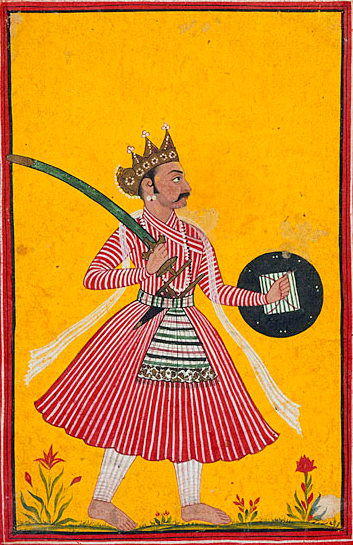 |
| Il combattimento tra Bhima e Duryodhana |
Eravamo al diciassettesimo giorno della grande battaglia di Kurukshetra narrata dal Mahabharata. I Pandava stavano sconfiggendo i cugini Kaurava che tredici anni prima avevano con l’inganno usurpato il trono.
Dei cento figli del re cieco Dhritarashtra ne rimaneva uno, il perfido Duryodhana, colui che rappresentava la causa della più grande e sanguinosa guerra dell’umanità. Il giorno dopo si sarebbe scontrato con Bhima in quello che presumibilmente sarebbe stato il combattimento finale.
La regina Gandhari, madre di Duryodhana, era sopraffatta dal dolore per aver perso tutti i propri figli tranne uno, voleva ad ogni costo salvare Duryodhana anche se sapeva che tutta la tragedia era conseguenza delle colpe del figlio.
Gandhari, che dal momento delle nozze si era coperta gli occhi con una benda per divenire cieca come cieco era suo marito Dhritarashtra, si era sottoposta ad austerità e meditazioni che le avevano conferito grandi poteri. Si fece condurre quindi sul campo di battaglia per dare una possibilità di salvezza al figlio.
“Figlio mio – disse Gandhari a Duryodhana – domani mattina prima di andare a combattere vieni nella mia tenda completamente nudo.”
Il giorno dopo Duryodhana si recò dalla madre senza vestiti indosso, ma all’ingresso della tenda si imbattè in Krishna, alleato dei nemici Pandava, che era andato a rendere omaggio alla regina, non a caso proprio in quel momento.
“Duryodhana perché sei così, tutto nudo?” chiese Krishna.
“Devo recarmi dalla regina mia madre,” rispose Duryodhana.
“Ma è sconveniente e non è consentito presentarsi alla propria madre in questo stato, cingiti almeno i fianchi con un panno,” replicò Krishna.
E Duryodhana, imbarazzato, così fece ed entrò nella tenda della madre.
“Eccomi madre – disse – sono qui davanti a te.”
Gandhari, per la prima volta da quando si era sposata, si tolse la benda e col suo sguardo mistico infuse nel corpo del figlio l’invincibilità, ma al tempo stesso la regina si disperò.
“Perché ti sei coperto i fianchi con un panno? In questo modo le parti del tuo corpo che non sono state esposte al mio sguardo saranno vulnerabili!”
“E’ stato Krishna a dirmi che non era opportuno presentarmi a te senza vestito alcuno, e così io ho fatto.”
Krishna! La regina capì. Anche il destino del suo ultimo figlio era segnato. Il giorno dopo Duryodhana venne ucciso da Bhima che gli spezzò entrambe le gambe.









